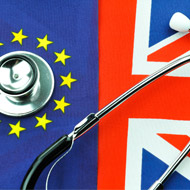Vets discuss access to medicines post-Brexit

“It is vital that Brexit negotiations ensure ongoing access to all existing and new veterinary medicines licensed through the EU and other regulatory systems."
Access to veterinary medicines could potentially be restricted after Brexit, vets are warning, as they urge the UK government to guarantee the profession will have ongoing access to EU-licensed veterinary medicines.
European legislation currently regulates the way veterinary medicines are authorised, marketed and used. However, after we leave the EU, the market for English-language labelling and data information will shrink, which could impact those EU countries - including the Republic of Ireland - that rely on licensing and packaging with the UK.
“This is a big problem,” said Veterinary Ireland president, John O’Connor, at a Brexit meeting last week. “If Brexit prompts EU medicine manufacturers to decide that English-language packaging and information-leaflets aren’t commercially viable then what is the Republic of Ireland going to do – start producing medicines ourselves?
“It is vital that Brexit negotiations ensure ongoing access to all existing and new veterinary medicines licensed through the EU and other regulatory systems so that it does not lead to interrupted supply difficulties for any existing stakeholders. This could seriously put at risk animal health, welfare and food safety.”
BVA and Veterinary Ireland agreed the uncertainty over future licensing and supply of veterinary medicines for Great Britain, Northern Ireland and the Republic of Ireland, is a pressing concern. BVA has urged the government to ensure veterinary surgeons will continue to have access to current and future medicines licensed through the EU regulatory systems.
There are also concerns that pharmaceutical companies may be unwilling to fund separate applications to both the UK and the European Medicines Agency. BVA says any new regulatory model must maintain links between licensing systems in the UK and the EU’s approval systems.
BVA junior vice president Simon Doherty, who chaired the meeting, said: “For animal health and welfare, public health and food safety and trade, the veterinary profession in Great Britain and across the island of Ireland must continue to have access to medicines for the treatment of animals that meet standards that ensure safety, quality and efficacy.
“Continued cooperation, like this, with our colleagues in the Republic of Ireland is vital to ensure the strong cross-border relationships, the integrated North-South structures and daily movements of people, livestock and pets can continue for the benefit of animal health and welfare.”
Another priority issue discussed at the meeting from the Common Travel Area, which pre-dates the EU and allows around 30,000 movements of pets, people and livestock every day. The veterinary organisations say they will encourage their respective governments to consult on the best way to ensure trade and professional services can continue without disruption.



 The Veterinary Medicines Directorate (VMD) is inviting applications from veterinary students to attend a one-week extramural studies (EMS) placement in July 2026.
The Veterinary Medicines Directorate (VMD) is inviting applications from veterinary students to attend a one-week extramural studies (EMS) placement in July 2026.